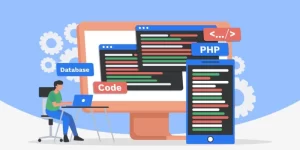PHP (Hypertext Preprocessor) has long been a cornerstone of web development, powering millions of websites and applications worldwide. As a versatile server-side scripting language, PHP offers numerous benefits, making it a preferred choice among developers. This blog explores the top reasons to learn PHP. Enrolling in PHP Training in Chennai at FITA Academy provides structured learning to master PHP effectively.
1. Widely Used in Web Development
PHP is one of the most used languages for web development. It powers over 79% of all websites whose server-side programming language is known, including major platforms like WordPress, Facebook, and Wikipedia. Learning PHP opens up many opportunities to work on diverse projects and contribute to the global web ecosystem.
2. Easy to Learn and Use
One of the key advantages of PHP is its simplicity and ease of use, especially for beginners. Its syntax is straightforward and similar to C and Java, making it accessible for developers with varying levels of experience. With a vast community and extensive documentation available, learning PHP is a smooth journey for those starting in web development.
3. Flexibility and Versatility
PHP is known for its flexibility, allowing developers to integrate it seamlessly with HTML and other web technologies. It supports various databases, including MySQL, PostgreSQL, and SQLite, enabling robust database-driven applications. PHP frameworks like Laravel, Symfony, and CodeIgniter further enhance its capabilities, offering pre-built modules and libraries for rapid development.
4. Powerful Support for Web Applications
PHP excels in building dynamic and interactive web applications. It supports features like form handling, file processing, and content management systems (CMS). Popular CMS platforms like WordPress and Drupal are built on PHP, showcasing its ability to manage content effectively and handle large-scale websites with ease. PHP Classes provide structured learning to master these capabilities and more.
5. Career Opportunities and Demand
Proficiency in PHP opens doors to a wide range of career opportunities. Many companies, from startups to large enterprises, seek PHP developers to maintain existing websites, develop new applications, and enhance user experiences. As businesses continue to expand their online presence, the demand for skilled PHP developers remains high in the job market.
6. Community and Resources
PHP boasts a vibrant and active community of developers worldwide. This community contributes to the language’s growth by sharing knowledge, troubleshooting issues, and developing open-source projects. Developers can access a wealth of resources, forums, and online communities to seek guidance, collaborate on projects, and stay updated with the latest trends in PHP development.
7. Scalability and Performance
PHP offers scalability, allowing applications to handle increased traffic and data as businesses grow. With advanced caching techniques and optimization strategies, PHP applications can deliver fast response times and optimal performance. Developers can optimize code, utilize caching mechanisms, and leverage PHP frameworks to build scalable applications that meet evolving business needs.
Learning PHP offers numerous advantages for developers looking to build dynamic, scalable, and feature-rich web applications. Its widespread use, ease of learning, flexibility, and strong community support make it an ideal choice for beginners and experienced developers alike. As the digital landscape continues to evolve, PHP remains a valuable skill that empowers developers to create innovative solutions and thrive in the competitive world of web development. Training Institute in Chennai provides opportunities to learn and master PHP, offering comprehensive training programs. Whether you’re starting your journey in programming or expanding your skill set, mastering PHP opens up a world of possibilities in the dynamic realm of web development.

